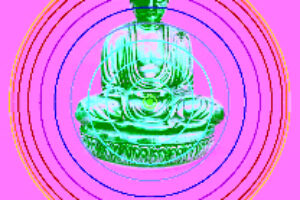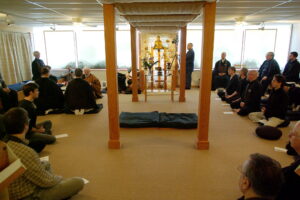
Last month we discussed the topic of anger and zazen, a subject that comes up often in dokusan and discussion. This month let us take a look at anxiety, and the relationship of zazen to our present Age of Anxiety. From Matsuoka-roshi’s collection of talks, The Kyosaku; Medical Aspects of Zen:
“…I believe Zen can be of great benefit to modern man. Its beliefs do not conflict with the findings of modern science, and its practice of meditation greatly helps us to adjust to life in modern society. I believe many psychologists, social workers, sociologists and psychiatrists are agreeing on the stresses and strains modern life is placing upon the nervous and physical system of people…it seems that this modern age has been labeled “The Age of Anxiety” for more reasons than one.
The point is that Buddhists believe Zen Buddhism can help one cope with modern life.
In spite of its material success, people complain of loneliness in the midst of elegant social whirls. There is a certain depth of the spirit that is lacking
Zengaku Soyu Matsuoka, roshi
To attack this matter from a different point of view, let me explain what I feel Zen can offer to the West. I look upon the United States as a fertile field for Zen. In Japan, many people look to the United States as the industrial leader of the world. Even though Japan itself is the leading industrial power of the Orient, many of its citizens see America as their ideal. They glorify America’s materialism. And yet, it is this materialism and highly advanced civilization that makes America such a fertile field for Zen.
The United States is often criticized or characterized by its rapid industrial growth and lagging social adjustment. Its great centers of urbanization contain some of the worst slums in the world. Crime abounds and grows each year. Prejudice and discrimination is its worst social problem. The cities grow impersonal, mental illness increases and social theorists speculate on the causes and cures for juvenile delinquency.
Persons all over the world are dreaming about the United States and idealizing it. They idolize its material success. But, if they were to see much of the true conditions here, they might be disheartened. They do not see the impersonal rudeness of many persons, or its open discrimination, or its other weaknesses. A large society is bound to become impersonal and have such problems, for these things come with urbanization.
And yet, something is missing. In spite of its material success, people complain of loneliness in the midst of elegant social whirls. There is a certain depth of the spirit that is lacking. It was this need for a deep spiritual life that drew me to the United States. I knew the strength of the Zen spirit, and how this could change lives, transforming them into pillars of virtue and endurance, of compassion and wisdom. It was this spiritual life which I wished to introduce to the American people so that it could take root and grow among them.”
November is Founder’s Month, during which time we remember Matsuoka-roshi’s legacy to us as the inheritors of his Zen lineage. 2010 marks the 98th anniversary of his birth, and the 13th anniversary of his death. He would be proud to see the living Zen spirit of his dharma grandchildren as practiced by the Disciples and Priests of the Silent Thunder Order and the network of Affiliates we have established. He would also still be saying pretty much the same thing he said in the above quote, nearly fifty years ago.
For the Age of Anxiety has not passed. We have developed more and different things to be anxious about, and even have a color-coded system to tell us just how anxious we should be on a day-to-day basis about such things as air pollution and terrorism. Anxiety still sells. When we run a little low on anxiety, not to worry, some politician will gin up a new source of fear and loathing to feed the ever-rapacious appetite of the hungry ghosts of the news media.
So if you are feeling a bit out of sorts, it is not entirely your fault.
Buddhism, Zen in particular, has traditionally cast a jaundiced eye toward the ravings and rantings of the Chicken Littles du jour. When you look closely, you see that there is at least one hidden agenda behind all the noise. If you pay attention over time, you begin to see that it is the same mindless frenzy coming around again and again in slightly different guise, just as our monkey mind will ferret out and shine its light on imagined as well as potentially real threats to our existence, comfort, and sanity. It is as if the monkey minds of the mob merge, thanks to the permeating presence of all-information-all-the-time, into a kind of uber-monkey-mind, de Chardin’s collective noosphere gone starkers.
Zen has always addressed the threatening aspect of existence with zazen. When we practice zazen, we always have a place to go. It is not an escape, but an effective and efficient method of dealing with whatever variation on the theme of suffering is being dished up to us at the moment. Most methods of mitigating anxiety rely on careful analysis of the situation, comparisons to others far worse off, and other mind-games that fall roughly into the category of cognitive therapy — substituting pleasant thoughts for unpleasant ones. Zen takes the more brutally simple approach of confronting the anxiety directly.
Whatever circumstances we face, they can be reduced to the single, central circumstance of existing in a world we cannot control. Oh, we can control things to a degree, but when it comes to the cardinal dimensions of dukkha — aging, sickness and death — we have to admit that we can only postpone the inevitable for so long. Billions of dollars are spent annually to stave off even the appearance of aging, billions more on preventing or disguising sickness, and yet billions more on coping with death.
So it would seem that our anxieties basically reduce to the fear of suffering the known or anticipated pains and discomforts, as well as the unknowns — what is death, really?
Zen posits that we can face these central facts directly, through zazen. It even claims that we can “die on the cushion.” Many would insist on interpreting this bizarre proposition in a watered-down way, that it means the psychological death of the small self, not actual death. But Zen’s reality is based on experience. There is no indirect way of knowing what we really need to know. Thus, dying on the cushion is experiential. As such, it has to be indistinguishable from actual death. This is why, and how, the Ancestors were able to recognize the onset of their actual death, and sit down and die.
The dead have no anxieties. An old saying says something like, “Be dead, be completely dead; then do as you will, and all will be well.” This is not morbid. It is life.









